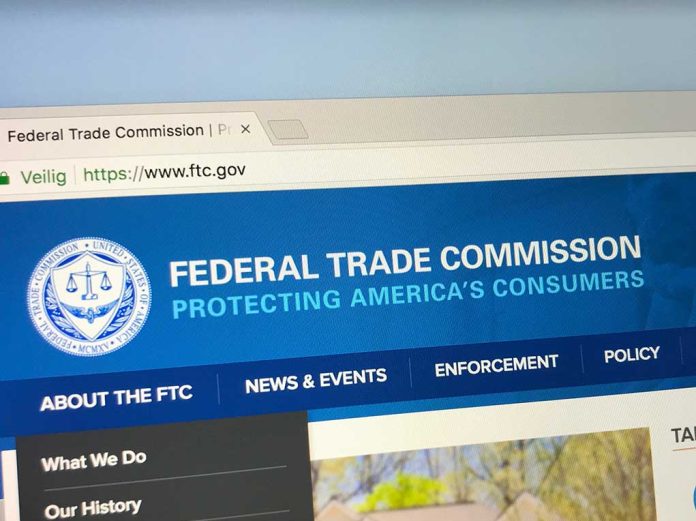
The Trump administration’s Federal Trade Commission has launched a sweeping antitrust investigation into left-wing media organizations accused of coordinating illegal boycott campaigns designed to silence conservative voices across America’s media landscape.
Key Takeaways
- The FTC, led by Chairman Andrew Ferguson, is investigating approximately a dozen left-wing media and advertising groups for potential antitrust violations in coordinating advertiser boycotts against conservative outlets.
- Media Matters and Ad Fontes Media have confirmed they are subjects of the investigation, with the FTC issuing Civil Investigative Demand letters requiring document production.
- The investigation partly stems from the dispute between Media Matters and Elon Musk’s X platform, where Media Matters allegedly misrepresented content to drive advertiser boycotts.
- Conservative advocates support the investigation as a necessary protection against coordinated censorship, while targeted organizations claim it represents political retaliation.
- The FTC’s focus reflects President Trump’s broader initiative involving multiple federal agencies to address what his administration terms a “censorship cartel” operating against conservative viewpoints.
FTC Targets “Censorship Cartel” Under Trump Leadership
The Federal Trade Commission under President Trump has launched a significant investigation into what many conservatives have long suspected – coordinated efforts by left-wing media organizations to silence conservative voices through organized advertiser boycotts. This investigation represents part of a broader initiative involving the FTC, FCC, and Department of Justice to address what the administration has identified as a “censorship cartel” operating across digital media platforms. The inquiry examines potential antitrust violations when media groups and advertising entities collaborate to push advertisers away from conservative outlets.
“As the Supreme Court said back in 1945, ‘The Constitution guarantees freedom to publish, but freedom to combine to keep others from publishing is not,'” said Logan Spena, legal counsel for Alliance Defending Freedom.
Media Matters and X Battle at the Center of Investigation
A significant catalyst for this investigation appears to be the high-profile conflict between Media Matters and Elon Musk’s X platform. The FTC is investigating claims that Media Matters illegally coordinated with advertisers to boycott X after publishing research highlighting antisemitic content on the platform. This research prompted major corporations, including Apple and IBM, to pull advertising from X, resulting in substantial revenue losses. In response, Musk filed a lawsuit against Media Matters, alleging the organization manipulated its research by creating artificial user experiences that misrepresented typical content exposure.
“We must prosecute any unlawful collusion between online platforms and confront advertiser boycotts that threaten competition among those platforms,” said FTC Chair Andrew Ferguson.
Media Matters has counter-sued X for breach of contract, characterizing Musk’s legal actions as a “vendetta-driven campaign.” The organization has confirmed it is subject to the FTC’s investigation but portrays the inquiry as political retaliation rather than legitimate regulatory oversight. The legal battle has grown increasingly contentious, with both sides potentially facing extensive discovery processes that could expose internal communications and decision-making processes.
Broader Investigation Targets Multiple Organizations
The FTC investigation extends beyond Media Matters to approximately a dozen media and advertising organizations suspected of coordinating efforts to disadvantage conservative outlets. Ad Fontes Media, which produces media bias ratings, has also confirmed its involvement in the investigation. The company’s CEO, Vanessa Otero, criticized the FTC’s demands as “excessive” while stating they would comply with the investigation. These “ratings outfits” have become particular targets of conservative criticism for their perceived role in justifying advertiser decisions to avoid conservative platforms.
“These so-called ‘ratings outfits’ are the left’s latest attempt to silence conservatives,” said Dan Schneider of the Media Research Center’s Free Speech America.
The FTC has issued Civil Investigative Demand letters to the organizations involved, requiring them to provide extensive documentation and respond to detailed inquiries. These administrative subpoenas represent a significant escalation in regulatory scrutiny of media organizations that have long been accused by conservatives of operating in a coordinated fashion to limit the reach of right-leaning viewpoints. While the FTC has declined official comment on the specifics of the investigation, Chairman Ferguson has previously expressed concerns about advertisers coordinating to ban certain ideas from the marketplace, which he views as a significant threat to free speech principles.
Free Speech Implications and Political Divide
The investigation highlights fundamental disagreements about the boundaries between free speech, private business decisions, and potentially anticompetitive behavior. Conservatives view these investigations as necessary protections against coordinated efforts to silence their viewpoints across media platforms. The tension between maximizing user engagement and maintaining advertiser-friendly environments has created complex market dynamics that many conservatives believe have been weaponized against them through coordinated action. The investigation may ultimately determine whether advertiser decisions represent legitimate business choices or coordinated antitrust violations.
“The Trump administration has been defined by naming right-wing media figures to key posts and abusing the power of the federal government to bully political opponents and silence critics,” said Angelo Carusone, president of Media Matters.
The outcome of this investigation could have far-reaching implications for media organizations, advertising practices, and the ongoing debate about content moderation across digital platforms. If the FTC finds evidence of collusion among media organizations and advertisers, it could lead to significant enforcement actions and reshape the relationship between political content and advertising revenue across the digital media landscape. For conservative outlets that have long felt unfairly targeted by advertiser boycotts, the investigation represents a potential turning point in addressing what they view as systematic discrimination against their viewpoints.



